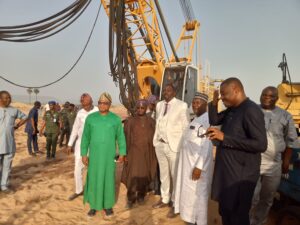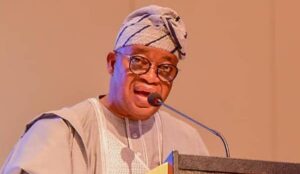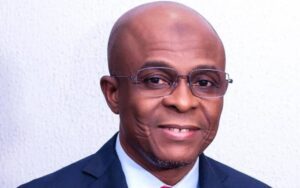


Oyetola receives Port Community System report
…To position Nigeria for increased global trade benefits
By Seun Ibiyemi
The Minister of Marine and Blue Economy, Adegboyega Oyetola CON, on Tuesday, formally received the report for the implementation of the Port Community System (PCS) in Nigeria, a move that will enhance the ease of doing business in ports within the country.
The PCS initiative aligns with the Convention on Facilitation of International Maritime Traffic (FAL) of the International Maritime Organization (IMO), and its objectives include preventing unnecessary delays in maritime traffic, enhancing cooperation between governments, and ensuring uniformity in formalities and procedures.
Speaking during the event held in Abuja, Oyetola who disclosed that the implementation of the PCS was a Key Performance Indicator given to his Ministry by President Bola Ahmed Tinubu, noted that the adoption of the initiative would position Nigeria to benefit from global trade opportunities.
“Realising the importance of the implementation of the PCS on the fulfilment of the overarching objectives of the Renewed Hope Agenda, His Excellency, President Bola Ahmed Tinubu GCFR included the implementation of the Port Community System as a Key Performance Indicator for the Ministry of Marine and Blue Economy under the Presidential Performance Bond I signed as a Minister,” he said.
The Minister commended the management of the Nigerian Ports Authority, NPA, for their foresight in seeking technical guidance from the International Maritime Organization, IMO, in the development of the PCS report.
While assuring that he would play a leading role in achieving the objectives of the initiative, Oyetola urged the NPA to expedite the procurement process for appointing a company to deploy the PCS and to seek ministerial intervention where necessary, particularly in areas outside their jurisdiction, such as linkages with the Nigerian Customs Service and other relevant agencies.
He also commended the team from IMO, project consultants, and the International Port Community Systems Association (IPCSA) for their professionalism and dedication in coming up with the PCS report.
Also speaking at the occasion, the Managing Director/CEO of NPA, Mohammed Bello Koko said automation remains the most sustainable path to make ports in Nigeria more efficient and competitive, adding that “the implementation of the PCS would eliminate all forms of human interface and attendant delays that undermine the efficiency of our ports.”
Koko, who described the implementation of the PCS as a matter of national importance, assured the Minister that the NPA would ensure diligence, determination and discipline required to make the implementation of the initiative a reality.
Recall that the NPA Managing Director had recently sought and secured the buy-in of the Comptroller-General of Nigerian Customs, Mr. Adewale Bashir Adeniyi MFR for the implementation of the PCS.
These developments signposts better days ahead for ease of doing business and trade facilitation in Nigeria.



